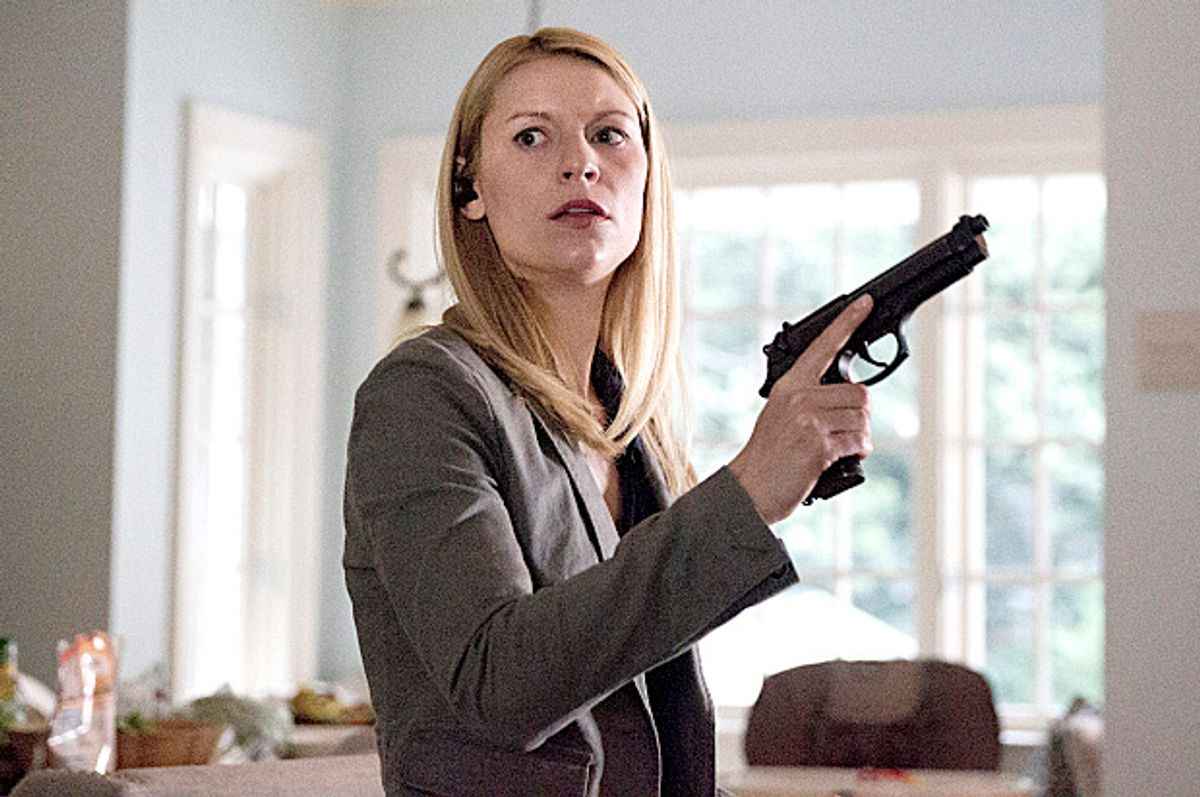Following the climactic events of last night’s “Homeland,” it’s hard to deny that the show still has incredible appeal. The last 15 minutes of “There’s Something Else Going On” are a suspenseful, operatic race to completion, as Carrie enters the final stages of negotiating Saul’s release from captivity. It reminded me that despite the show’s many missteps, at its heart it is something fascinating and fresh, even four seasons in. Very few other shows on television could even approach the real-time, gritty suspense of “Homeland,” which in last night’s episode included an attack by rocket-propelled grenades and child willing to wear a suicide bomber’s vest. Few shows would even try—“Homeland”’s success in its first two seasons was deeply rooted in how the show attempted to tell a version of the truth of the war on terror, and that’s territory that is still largely its own. Other show about the CIA include the hilariously farcical “The Blacklist,” “State Of Affairs,” and “Madam Secretary,” all of which combine intelligence drama with a strong dose of magical thinking.
“Homeland” lacks the idealism of these shows, and their glossed-over tactics, too: Where “Madam Secretary” in particular doubles down on the inherent goodness of the American Way, “Homeland” is loath to offer any such comfort. The character drama of the first season was driven almost entirely by the nuance of Brody’s shifting loyalties as well as Carrie’s own convoluted idea of what it means to be a good agent. The longstanding argument for why “Homeland” has lost its way since season two has been that the show got caught up in the soap opera of Brody and Carrie’s romantic relationship. That’s true, but I think there’s another part to it: “Homeland” stopped inquiring after its characters’ deeper motivations to tie off some loose plot threads. It has transformed from character drama to action movie—or, as Todd VanDerWerff over at Vox argues, to pure opera. The stories of “Homeland” have become splashier, grander struggles—and to me, the most telling change is that there are big quadrants of characters that can now be written off as either “good” or “bad.”
The big emotional payoff of Sunday’s episode, “There’s Something Else Going On,” is an exchange between Carrie and Saul, during the prisoner exchange, where Saul refuses to go on with the deal and Carrie, sobbing, drags him out of his self-pity by reminding him that he’s not one of “them.” The moment is strong—Carrie’s relationship with Saul is one of the guiding lights of this show, a mentorship that grounds a lot of the intelligence work in their no-nonsense, eternally honest connection.
But what struck me as a false note was Carrie’s use of the word “them,” because I couldn’t entirely fathom: Who is them? Who is us? VanDerWerff makes a compelling argument about how Carrie, Saul, and other players in “Homeland” are stand-ins for how America feels about itself. But it’s odd—this show, at its best, has been about highly specific situations, not highly allegorical ones. The canvas it’s playing with is, as “Law & Order”’s promo spots would say, “ripped from the headlines”: The Pakistani government’s complicity in terrorism—including the groups Lashkar-e-Taiba and Al-Qaeda—is a real-life quagmire of diplomacy, defense, and porous borders. How do you set a larger-than-life opera in a setting that is so achingly real its details jump out from the screen?
The answer is, I think, suspense: In the blow-by-blow breakdown of Saul’s kidnapping—which is little except a neat contrivance to keep Mandy Patinkin on as a series regular—the plotting keeps audiences hooked, while the moral ambiguity that made the show great gets left in the dust. Action movies are wonderful; good action movies are rare, wonderful finds. But “Homeland” was more than that, and still has so many of the qualities that would make it into that complex, identity-interrogating drama that drew in audiences. But it’s not choosing to pursue them. I don’t exactly blame the show: If I had Claire Danes and Mandy Patinkin on staff, I’d want them to act out tortured father-daughter love every day of the week. But the show is, in the process, ignoring the shifting loyalties and inner lives of other, fantastic characters: What about Rupert Friend’s Peter Quinn, who’s been struggling with his complicated feelings towards Carrie while finishing a job he swore he would leave behind? Or Nazanin Boniadi’s Fara, the Iranian-American CIA agent with complex ties to the region and to her own government? There’s also Raza Jaffrey’s Aasar Khan, who took time in last week’s episode to give Carrie information that worked against his own team. There’s even Nimrat Kaur’s Tasneem Qureshi, a female ISI agent pretty obviously working for the terrorists.
Showtime has granted on “Homeland” a lot of resources—a fantastic cast, a massive production budget, and location shooting on a whole other continent. Given what it’s got, why is the show telling this story? What we’re seeing here doesn’t feel vital to me the way “Homeland”’s past did. Interesting, well-executed, and certainly engrossing. But a little too simple, a little too clean-cut. If I’m sparing with my praise, it’s because I know this show can do better. This is not “Homeland” at its best.



Shares